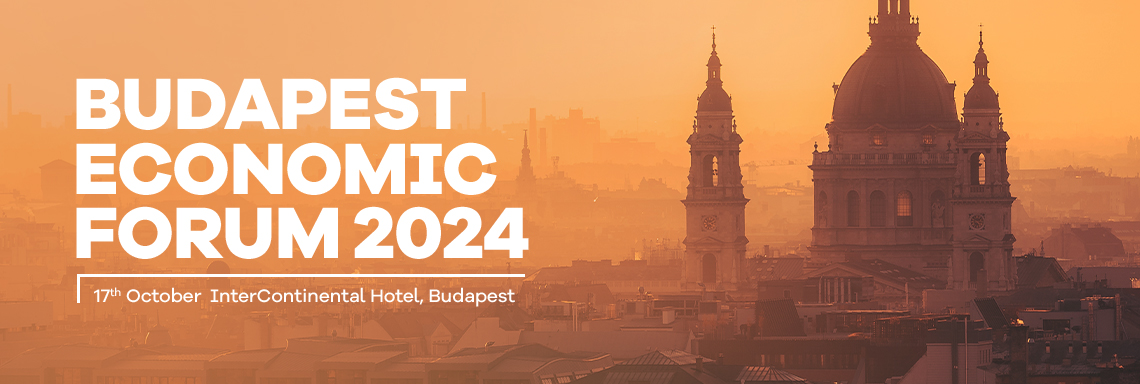Budapest Economic Forum 2024

Program
The Hungarian economy has gone through a turbulent period, and we are now heading into a new election campaign. What kind of economic and economic policy environment will Hungary face in the next one to one and a half years? Government and corporate actors will explore this.
Economic growth is recovering more slowly than expected this year, with a rebound in consumption still awaited; however, the suffering of investments is even more concerning. In such an economic environment, planning for companies is not easy, especially since the constant need for budget adjustments can regularly lead to surprises on the tax burden side, and the state's economic involvement and activity do not decrease either. We can learn how the corporate sector is adapting to such an environment from the leaders of the largest domestic companies listed on the Hungarian stock exchange. At the same time, we will gain insight into the prospects of the Hungarian economy through the lens of corporate leaders.
The Hungarian economy does not exist in a vacuum; its performance significantly depends on global economic processes. Therefore, to decipher the prospects of the Hungarian economy, we must be aware of the inflation and growth figures of the largest economies and their economic policies, particularly their interest rate policies, namely the actions of the Fed and the ECB. In addition, the myriad of international conflicts, power struggles, and diplomatic conflicts make it crucial to understand the most important geopolitical trends in the short and long term. Such political tensions can determine the development prospects for the Central and Eastern European region, including Hungary.
The Hungarian economy is only sluggishly recovering; EU funds are not coming in, investments are stalling, and industrial performance is modest. It raises the question: how can we revive the Hungarian economy? To what extent do monetary policy and interest rates play a role? Where and with what force can budgetary policy intervene? According to our current knowledge, what are the prospects for the Hungarian economic model? Is the current "struggling" period in the economy natural and cyclical, or is the problem more significant and structural? Does this justify a competitiveness reboot, and if so, in which areas of economic governance? How can SMEs, which form the backbone of the Hungarian economy, benefit from this? Can the new support and lending incentive programmes come in, and everything will be fine, or is there a more serious problem? How well prepared is the domestic SME sector to handle the spectacular wage increases in the coming years, or are they facing potential difficulties? Which organisations and institutions can domestic small and medium-sized enterprises rely on as allies for their development?
Will the turning point arrive, and will state programmes be initiated to boost SMEs’ performance? What are the prospects for market lending? How can we improve the efficiency and long-term competitiveness of the small and medium-sized enterprise sector, which forms the backbone of the Hungarian economy? Who has a responsibility and role in this? After enduring a series of crisis phenomena, what is the current state of the Hungarian SME sector?
In recent years, banks have had to actively adapt to frequent regulatory interventions, which have come in various forms: you can think of tax increases, supplementary transaction fees, pension fund savings, and maximum mortgage APRs. How did the banking sector respond to all this, and how can it contribute to the growth of the Hungarian economy in this situation? To what extent does the current interest rate environment support the initiation of lending and economic growth, or is it not all about interest rates?
Ask the country's most knowledgeable and prominent economic experts about the opportunities and side effects. The prospects of the Hungarian economy can be shaped not only by the continuously changing environment but also by the transforming economic policy in the short term. A change in the central bank governor is imminent, the 2026 parliamentary elections are approaching, and the government is planning an economic management review. What can be expected regarding the investor perception of Hungarian assets, the euro-forint exchange rate, the financing of Hungarian public debt, and our growth prospects in general? Renowned economists, hot topics, and notable responses.
The economies of Poland, Romania, Slovakia, Croatia and Hungary have become more aligned in their performance. But what is the status of competitiveness in these countries and their future trajectories? Will there be laggards? Could the progress towards developed economies stall? What should be done to prevent this?
The country's leading macroeconomic analysts and economists are discussing the prospects for the convergence of the Hungarian economy. The discussion will reveal the criteria and indicators used in the increasingly intense competition among regional countries to decide what areas Hungary excels in and where it lags behind.

Contact



